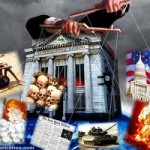“The agency, according to the documents and interviews with industry officials, deployed custom-built, superfast computers to break codes, and began collaborating with technology companies in the United States and abroad to build entry points into their products. The documents do not identify which companies have participated.” from ProPublica
– dennis
= = = = = = = = = = = = = = = = = = =
As someone who thinks of himself as a futurist, I tend to keep my eyes peeled for patterns and connections which can, possibly, indicate something about our future.
There are two things going on now which I think are going to conjunct and increase the penetration into our personal lives of the nascent police states that most western democracies are steadily becoming.
The first thing
Is already visibly in motion. That is the efforts of the American NSA to penetrate everyone and everything in the name of national security; as revealed by Edward Snowden’s documents.
It is now open knowledge that the NSA has broken most of the cryptology that we’ve depended on to keep our personal information safe from prying eyes.
This would include your computer passwords.
And any files you store in encrypted form. And any files you send. And any files you receive in encrypted form.
And, if they have access to your computer passwords, then they have full access to all your files and all your stored e-mail.
If they have all of that, then what do you have?
Bupkis – you don’t have much that’s yours, if they want it.
The criminal hackers of the world would be overjoyed to have that sort of access. If they did, your computers would be full of malware, trojans and key loggers before you could blink.
I suppose we can just hope that the folks in the NSA that have access to this sort of power are using it exclusively for the public good.
The second thing
Has only just recently come into play. These are the little devices called “Tiles” that you may have seen advertised. They’ve been sold on-line now for a few months and the first deliveries are scheduled for winter 2013/2014. I bought one recently for $18.95 USD out of curiosity.
Tiles help you find things. They are about an inch square, made of white plastic, about 1/8 of an inch thick and they have a small hole on one corner so you can tie or attach them to things. You can also stick them onto things with two-sided adhesive.
They have a non-replaceable battery in them that runs for about a year and they communicate back and forth via the Bluetooth short-range radio. They come with an application program that runs on your iPhone and the program can help you find one of your Tiles if you’ve lost it and whatever it is attached to like your keys, or your backpack or whatever.
If, for example, you’ve lost your keys, you fire up the Tile application program and ask it to locate the Tile attached to your keys.
If you are within about 50 to 150 feet or so of your keys (the range varies with terrain), the application program will show you on your iPhone where the Tile (and your keys) are … out in the garage.
Ah! And then you remember that you laid them down on the work bench when your phone rang as you were getting the groceries out of your car.
One more thing about Tiles. If you really lose something, like your motorcycle is missing through theft, and you were thoughtful enough to have had a Tile attached to it, you can contact the Tile people and they will put out an alert on that Tile.
Once a Tile has an alert on it, any iPhone in the world running the Tile application program that passes with 50 to 150 feet or so of your sought-after Tile, will silently send a message to the Tile people indicating that it ‘saw’ your Tile and provide the GPS location where it was.
The person carrying the iPhone running the Tile application program that located your Tile won’t even know any of this happened.
So, where ever folks are wandering around with the Tile application program on their iPhones, a quiet and constant search is being made all the time for lost Tiles (and whatever’s attached to them).
So, how does this link to the NSA and future developments?
Well, it goes like this.
The first thing to realize is that the NSA folks are certainly smarter than the average bear. They could, and probably already have, made something very much like the Tile. Something that’s a lot smaller, harder to detect, has better range, longer battery life and etc. Let’s call these special NSA versions NSATiles.
The second thing to recognize is that the NSA already has the technology to break and enter into virtually any computer they want to; including our iPhones.
So, if they wish to, they can populate most of the world’s iPhones with a sweet little bit of hidden software that none of us would know about that does just what the Tile application program does; except for NSA’s purposes.
Mmm. Perhaps, I’m not thinking this through clearly?
Why should they need to insert new clandestine software into our iPhones from the outside?
The recent news from Edward Snowden has also revealed that the NSA has, under national security laws, forced some of the major software companies in the US to install ‘backdoors‘ into their software so the NSA can go in and look at what it wants to even while users of that software think their privacy is secure. Moreover, the NSA has enjoined these companies to say nothing of this; again under the threat of national security laws.
So, why couldn’t the NSA have pressured Apple to add NSATile detection and reporting software? They’ve done a lot of this sort of thing already. And, Apple couldn’t warn us without breaking the law.
In short, there’s no reason why the NSA cannot use our millions iPhone devices to clandestinely scan the world for NSATiles that the NSA is interested in tracking.
And, when your iPhone sees such an NSATile, it will silently “phone home” to the NSA and report it along with its GPS coordinates. Nice, eh?
So, we will be an entire world of folks wandering around with iPhones doing the NSA’s bidding and looking for anyone or anything that the NSA wants to track geographically. Terrorists, demonstrators, spies, packages, books, animals, us … you name it.
And all of us doing NSA’s bidding unknowingly.
Will this happen?
The real question, I think, given that capabilities described already exist, is why wouldn’t it be happening now? After all, knowledge is power and this is government we’re talking here.
In a related development
There’s a parallel development involving very similar technology, see this article which I just encountered today by coincidence.
It is about something called iBeacon which is part of Apple’s newly released iOS 7 software.
This new iBeacon technology will be coming to a shopping center near you soon and it’s going to be talking to your iPhone as you walk by the stores. It’s going to be trying to sell you things.




